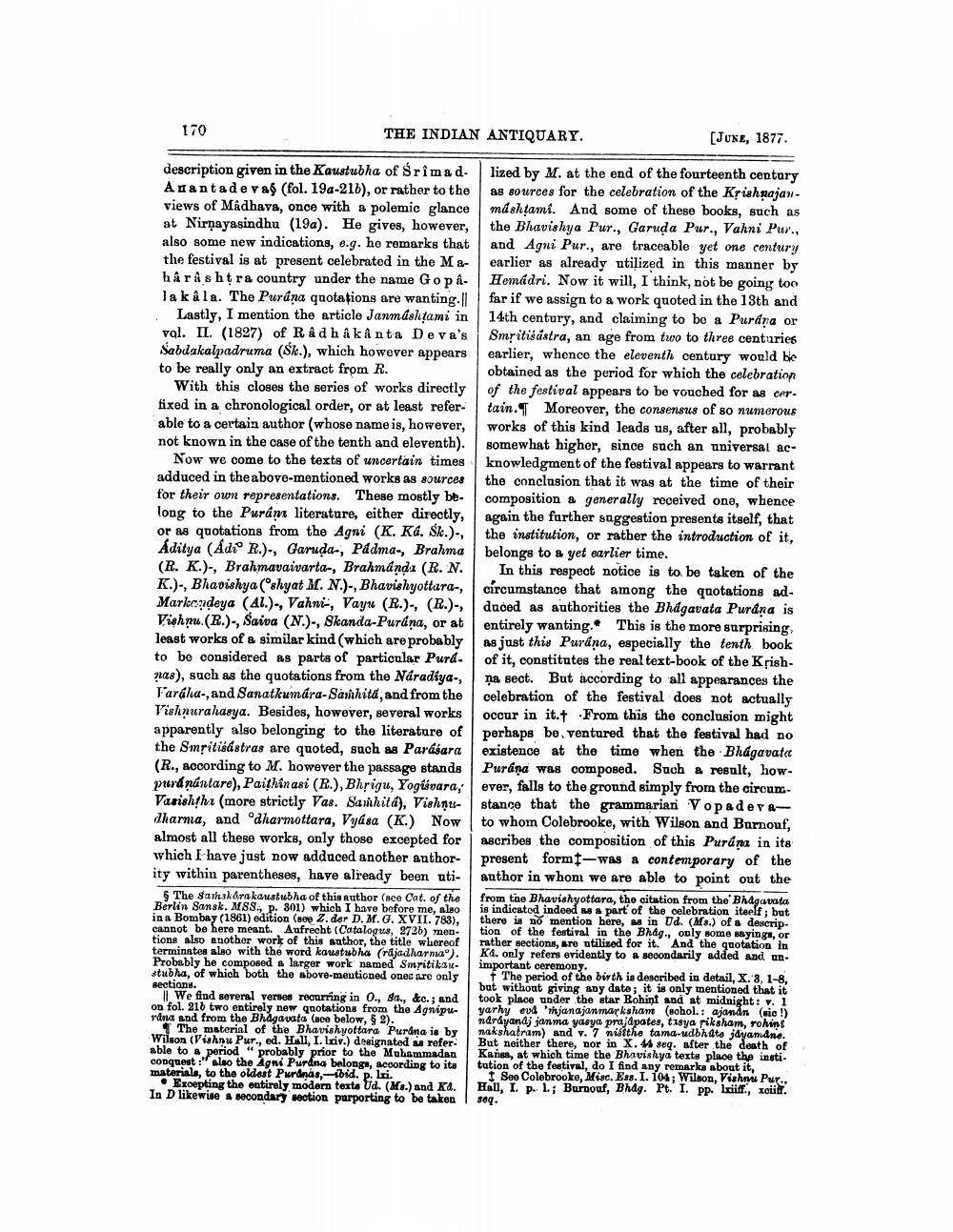________________
170
THE INDIAN ANTIQUARY.
(JUNE, 1877.
description given in the Kaustubha of Srimad. lized by M. at the end of the fourteenth century Anantade va$ (fol. 19a-216), or rather to the as sources for the celebration of the Kộishnajanviews of Madhava, once with a polemic glance mashtami. And some of these books, such as at Nirnayasindhu (19a). He gives, however, the Bhavishya Pur., Garuda Pur., Vahni Pwr., also some new indications, e.g. he remarks that and Agni Pur., are traceable yet one century the festival is at present celebrated in the M&- earlier as already utilized in this manner by harashtra country under the name Gopa- Hemadri. Now it will, I think, not be going too Ja kala. The Purana quotations are wanting.llfar if we assign to a work quoted in the 13th and
Lastly, I mention the article Janmashtami in 14th century, and claiming to be a Purana or vol. II. (1827) of Radh â kânta Deva's Smritisástra, an age from two to three centuries Sabdakalpadruma (Sk.), which however appears earlier, whence the eleventh century would be to be really only an extract from R.
obtained as the period for which the celebration With this closes the series of works directly of the festival appears to be vouched for as car. fixed in a chronological order, or at least refer- tain. Moreover, the consensus of so numerous able to a certain author (whose name is, however, works of this kind leads us, after all, probably not known in the case of the tenth and eleventh). somewhat higher, since such an universal ac
Now we come to the texts of uncertain times knowledgment of the festival appears to warrant adduced in the above-mentioned works as sources the conclusion that it was at the time of their for their own representations. These mostly be- composition a generally received one, whence long to the Puram literature, either directly, again the further suggestion presents itself, that or as quotations from the Agni (K. K. SL.), the institution, or rather the introduction of it, Aditya (Adi R.)-, Garuda-, Padma, Brahma belongs to & yet earlier time. (R. K.), Brahmavaivarta-, Brahmándı (R. N. In this respect notice is to be taken of the K.)., Bhavishya ("shyat M. N.)-, Bhavishyottara,
círcumstance that among the quotations adMarkondeya (Al.)., Vahni-, Vayu (R.)., (R.)-> duced as authorities the Bhagavata Purana is Vishnu (R.), Saiva (N.)-, Skanda-Purdna, or at entirely wanting. This is the more surprising, least works of a similar kind (which are probably as just this Purána, especially the tenth book to be considered as parts of partioular Purd. of it, constitutes the real text-book of the Krishpras), such as the quotations from the Náradiya, na sect. But according to all appearances the Varáha., and Sanatkumára-Samhita, and from the celebration of the festival does not actually Vishnurahasya. Besides, however, several works occur in it. From this the conclusion might apparently also belonging to the literature of perhaps be, ventured that the festival had no the Smritisástras are quoted, such as Parásara existence at the time when the Bhagavata (R., according to M. however the passage stands Purána was composed. Such a result, howparánántare), Paithanasi (R.), Bhrigu, Yogisvara, ever, falls to the ground simply from the circumVanishth(more strictly Vas. Samhita), Vishnu- stango that the grammariari V opadevadhama, and "dharmottara, Vyása (K.) Now to whom Colebrooke, with Wilson and Burnouf, almost all these works, only those excepted for ascribes the composition of this Purára in its which I have just now adduced another author- present formi-was a contemporary of the ity within parentheses, have already been uti- author in whom we are able to point out the
The sanskara kaustubha of this author (see Cat. of the from the Bhavishyottara, the citation from the Bhagavata Berlin Sansk. M88., P. 301) which I have before me, also is indicatod indeed as a part of the celebration itself, but ina Bombay (1861) edition (80p Z. der D.M.G. XVII. 783), there is no mention here, as in Ud. (M8.) of a descripcannot be here meant. Aufrecht (Catalogus, 972b) men tion of the festival in the Bhag., only some sayings, or tions also another work of this author, the title whereof rather sections, are ntilized for it. And the quotation in terminates also with the word kaustubha (rajadharna). Kl. only refers evidently to a secondarily added and onProbably he composed a larger work named Smritikai. important ceremony. stubha, of which both the above-mentioned ones are only The period of the birth is described in detail, X. 8, 1-8, Bections.
but without giving any date; it is only mentioned that it We find several verses recurring in 0. sa., &c.; and took place under the star Rohint and at midnight: v. 1 on fol. 21b two entirely new quotations from the Agnipu- yarly evd 'rhjanajanmarksham (schol.: ajanan (sic!) rdna and from the Bhagavata (noe below, 62).
ndrayandj janma yasya prajapates, tasya riksham, rohing The material of the Bhavishyottara Purdna ia by nakshatram) and v. 7 wisithe tama-udbhlte jdyamdne. Wilson (Vishnu Pur., ed. HAI, I. Iniv.) designated i refer But neither there, nor in X. 44 seq. after the death of able to a period "probably prior to the Muhammadan Kansa, at which time the Bhavishya texte place the insti. conquest." sloo the Agni Purdna belonge, according to its tation of the festival, do I find any remarks about it, materials, to the oldest Puranas, ibid. p. lsi.
See Colebrooke, Misc. Ess. I. 104; Wilson, Vishnu Puru, Excepting the entirely modern texta Ud. (Ms.) and Ka. Hall, I. p. 1.; Burnouf, Bhdg. Pt. I. Pp. loiiff, xciil. In D likewise a secondary section parporting to be taken seq.




